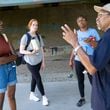Jesmyn Ward’s debut novel, “Where the Line Bleeds” entered the literary world with a bang when it was first published by Agate Publishing in 2008. The book launched Ward’s illustrious career, which has garnered her two National Book Awards, the first in 2011 for her novel, “Salvage the Bones,” and the second in 2017 for her most recent novel, “Sing Unburied Sing,” which is also a finalist for the 2017 National Book Critics Circle fiction award. In between novels, she’s penned an exceptional memoir, “The Men We Reaped,” which chronicles the lives of five men in her community who died in a five-year period, and also edited an anthology entitled, “The Fire This Time: A New Generation Speaks About Race.”
Scribner has now re-issued “Where the Line Bleeds” on its 10-year anniversary, reintroducing readers of the prolific author’s first foray into book-length prose. It tells the story of twin brothers, Christophe and Joshua DeLisle, raised by their blind grandmother, Ma-mee, in the rural Mississippi coastal town of Bois Sauvage, also known as “God’s country.” This same town is the setting in all of Ward’s novels.
Christophe and Joshua, in many ways, are two peas in a pod who “watched out for each other: juggled each other’s excuses, finished one another’s lies, and generally kept one another out of trouble.” Christophe is thin, his muscles ropey, his eyes so brown they appear black. Joshua, the taller of the two, is heavier set, freckled, with full lips and a jutting round nose. Their personalities diverge even more than their physical attributes. Christophe, “quick, hot-headed, trigger-tempted,” with “slow-smoldering anger,” charges head-first into the world. While Joshua hangs back a little, contemplating his next move, a slow deliberator guided by the “occasional quick, glancing, irrational recklessness.” The twins are most in sync on the basketball court, where they dominate their opponents while exchanging secret signals.
On the day of their high school graduation, the brothers wonder whether their mother, Cille, the manager of a beauty supply store in Atlanta, will make an effort to drive down to attend the ceremony, and whether their estranged, drug-addicted father Samuel, otherwise known as “Sandman,” might ever find his way back to Bois Sauvage. In the meantime, the boys are surrounded by the love of their grandmother, cousins, aunts, uncles and friends – a tight-knit community that has celebrated their every milestone, and will catch them should they falter.
After hanging up their graduation caps, Christophe and Joshua must find work to make up for the cash Cille will no longer be sending Ma-mee to support them. The pickings for employment in Bois Sauvage and the neighboring town of St. Catherine are slim, and many of their job applications lead to dead ends. Though greater economic opportunities await elsewhere, they refuse to abandon Ma-mee, whose declining health roots her to Bois Sauvage. “She’d spent her entire life working for one rich white household or another to earn money to feed them, dressing them when they were younger in clothes her employers had given her to take to the Salvation Army, providing for them the best she could. Now it was their turn.”
Tensions mount between the brothers when Joshua is offered a job at the pier and Christophe isn’t. The work is grueling and though he is desperate to help keep the household financially afloat, Joshua envies his brother’s lazy summer days. “He woke up each morning drained, and the brutal monotony of the work at the pier stunned him. Something about it felt insulting and wrong. He was jealous and would often not speak to his brother on the way to work, disgusted by the fact that Christophe would spend his day chilling at the park.”
Christophe, frustrated by his lack of employment prospects, considers dealing weed for their older cousin Dunny. It’s the first time his plans for himself begin to veer so far off the track. “He dreamed things, worked for them and they happened. He’d assumed this would continue after he graduated, that there existed steps to his life… The idea of a legitimate job had existed as an absolute in his head. It was the fulcrum upon which the bar of his dreams balanced.”
The growing pains of their fraternal bond reflect the unsparing sticky summer heat of the green lowlands and red clay earth. The question that meanders through the narrative, much like the muddy waters of the Mississippi, is this – at the cusp of adulthood, will the brothers continue to flow together or split like the river as it spills into the Gulf?
Ward was raised in the coastal Mississippi town of DeLisle (her characters’ surname is a nod to her hometown), and lives there today. The cinematic setting of the bayou in “Where the Line Bleeds” lives and breathes as effortlessly as her characters do, and Ward’s appreciation for the landscape shines through her prose. “Natural boundaries surrounded it on three sides … To the north, the interstate capped the small town like a ruler, beyond which thick bristle of pine forest stretched off and away into the horizon. It was beautiful.”
What’s surprising about “Where the Line Bleeds” is how equal in execution and craft it is to Ward’s most recent novel. If nothing else, this re-release serves as an important reminder that Ward is an author for whom there has been virtually no learning curve, and that to encounter “Where the Line Bleeds,” whether for the first or second time, is to experience the resplendent origin of such genius.
FICTION
‘Where the Line Bleeds’
By Jesmyn Ward
Scribner
256 pages, $15
About the Author






